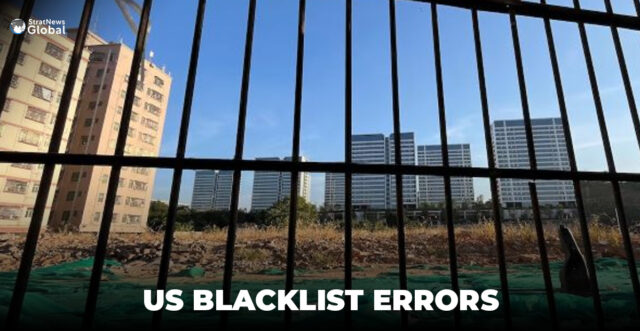Doris Au, who has sold door locks and hardware in Hong Kong for 25 years, said her business collapsed after receiving a letter from DBS Group in June stating her account has been added to a blacklist and would be closed. The bank offered little explanation and later froze the account, cutting her off from international suppliers.
Au discovered after searching online that another firm with a similar name was added to the U.S. trade blacklist in October 2023 for “providing support to Russia’s military and/or defence industrial base.” The entry identified two addresses, one of which was Au’s warehouse.
“We are not that company. It’s totally a mistake,” Au said in her warehouse stacked with locks, hinges and sliding-door kits from well-known brands.
Au’s predicament captures the challenge facing the administration of U.S. President Donald Trump as it ramps up limits on China’s access to American technology by adding dozens of Chinese firms to its blacklist.
Erroneous Details
Out of almost 100 Chinese and Hong Kong companies added to the U.S. entity list in 2023 and 2024 it was found more than a quarter, or 26 entries, contained erroneous details, such as incorrect names and addresses and outdated information.
The entity list, established in 1997, has become an increasingly important tool for the U.S. to limit technology transfers to Russia and China, including semiconductors, that might undermine U.S. security. It is managed by the Bureau of Industry and Security (BIS), a Commerce Department agency.
Five former U.S. officials acknowledged difficulties in evaluating possible cases of mistaken identity and updating information on the entity list, due in part to limited staffing. BIS is “woefully under-resourced,” one said.
Many listed entities are front companies, said Matthew Borman, who until March was a senior BIS official overseeing U.S. export controls, including those targeting China and Russia.
“The challenge is that they can move to a different address with a different name,” he said.
BIS and the Commerce Department didn’t respond to detailed questions about errors on the trade blacklist and any actions to rectify them.
Singapore-based DBS declined to comment on Au’s case. In its letter to Au, DBS didn’t mention the entity list but said it had reviewed her business account and found “activity/information that is not consistent with your account profile.”
Trade Flows
Under the Biden administration, the U.S. sought to limit transfers of technology that Russia needed for its war in Ukraine. The U.S. added hundreds of entities to contain Moscow’s access to such components, many made in China. It also used the list to limit China’s access to advanced capabilities in AI, military modernisation and quantum technology.
That trend is continuing under Trump.
The Commerce Department has claimed some success from its export controls in stemming chip flows to Russia via Hong Kong and China. But they don’t catch everything.
China’s Commerce Ministry didn’t respond to questions about trade in U.S.-restricted items with Russia. Moscow’s embassy in Washington also didn’t respond to questions.
‘Red Flag’
Blacklisted companies and addresses are barred from receiving restricted U.S. goods. Transactions with listed entities aren’t necessarily prohibited but should be treated with a “red flag,” and parties involved should conduct due diligence, BIS says on its website.
Borman said entities are listed based on BIS analysts’ review of open-source and classified information, and the process involves the Commerce, State, Defence, and Energy departments.
Denis Makkaveev, the Hong Kong-based director of Global Broker Solutions Limited, a freight-forwarding company that was entity-listed in 2023, told Reuters he was visited by two BIS agents in October.
“I’m the forwarder, the logistics guy. I don’t trade military goods,” Makkaveev said in his office in an industrial building, showing some of the semiconductors he was shipping.
Makkaveev said he got around his company’s blacklisting by setting up two new firms on Hong Kong’s Companies Registry, which took less than a week. He said he used e-commerce platforms to process payments after banks shunned him.
Around half of the entity-listed locations, according to sources, were company secretarial, or COMSEC, firms. They act as host addresses for businesses formed by overseas and China-based individuals on Hong Kong’s Companies Registry.
Some had overspilling mailboxes. Others were tiny cubicles in dilapidated industrial buildings.
Banks that facilitate transactions for entities shipping restricted goods to Russia or China can face hefty fines from the U.S.
That’s also where errors in the list came into play.
Locked Out
Au’s business name, Win Key (China-Hong Kong) Limited, resembles Win Key and its aliases Win Key Ltd and Win Key Limited, which BIS added to the entity list in 2023.
Russian customs data provided by Olena Bilousova, senior researcher at the KSE Institute, show Win Key Ltd shipped $147 million of goods to Russia that year, including $104 million in restricted items such as chips and communications equipment. The data show none of the goods came from Au’s warehouse.
The second address for Win Key Ltd identified by BIS was occupied by a company secretarial firm, Linkage Secretary Limited. It declined to comment about Win Key Ltd, which registry records show was dissolved in May 2024.
Taiwan joined the U.S. and its allies in enforcing export controls on Russia after it invaded Ukraine. The island’s economy ministry said it couldn’t comment on specific cases, but said Hong Kong’s Win Key Ltd had been added to Taiwan’s trade blacklist last October.
Since her address was blacklisted by Washington, Au says, U.S. and other foreign suppliers and couriers have refused to ship goods to her. She estimated her losses at over $600,000.
BIS says on its website that people can submit a request for an entity’s listing to be removed or modified.
Au said she emailed BIS accordingly. She said she got a response in December seeking further information, which she provided, but hasn’t heard more.
Two former U.S. officials said the appeal process is rarely used and tends to be treated with skepticism by U.S. authorities.
The entity list is “like the Hotel California,” said Steve Coonen, a former export control expert and foreign affairs adviser for the U.S. government.
“You can probably check in anytime you want, but you can’t ever leave.”
(With inputs from Reuters)





